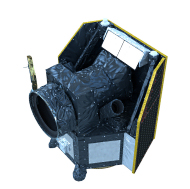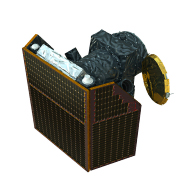Spacecraft
CHEOPS is a small spacecraft with a launch mass (including propellant) of approximately 280 kg. The spacecraft prime contractor is Airbus Defence & Space (ADS) - Spain. The satellite design is based on the use of the AS-250 platform, an ADS product line designed for small and medium size missions operating in Low Earth Orbit.
CHEOPS has one instrument – a photometer with a single CCD, operating in the visible/near-infrared wavelength range, that is at the focal plane of an on-axis Ritchey-Chrétien telescope of 32cm diameter (clear aperture diameter of 30cm). All platform requirements are aimed at supporting the functionality of the payload and its ultrahigh photometric precision. The main implications for the platform are related to pointing capabilities and the thermal environment for the payload.
 |
 |
 |
| Three views of the CHEOPS spacecraft. Credit: ESA/ATG medialab | ||
The instrument and telescope are mounted onto the platform via isostatic mountings, and are thermally decoupled from the rest of the spacecraft. A sunshield mounted on the platform protects the focal plane radiator and detector housing from solar illumination and also carries solar panels for the power subsystem. The satellite measures about 1.5 m high, with a hexagonal footprint of maximum 1.6 m.
The spacecraft is three-axis stabilised, with a pointing stability of better than eight arcsec at 95% confidence level over a 48-hour science observation. The payload will provide centroid data from the target star to the platform's attitude and orbit control system, to enable compensation of low-frequency pointing errors.
During each orbit, the spacecraft will slowly rotate around the telescope line-of-sight to keep the focal plane radiator oriented towards cold space, enabling passive cooling of the detector.



